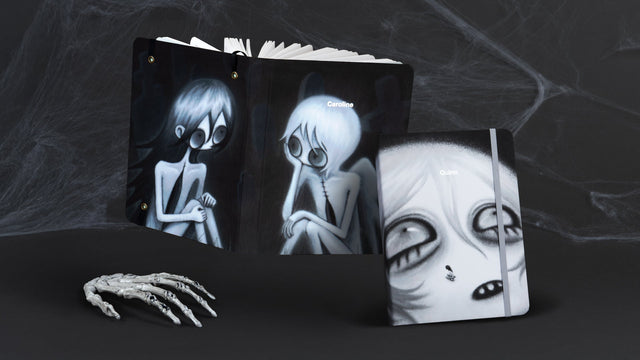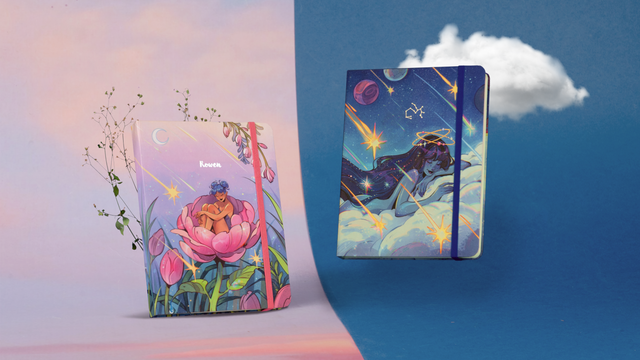More than just another lettering artist on Instagram, Nico is a bright and hustling creative at heart. From designing paper wallets from scratch to producing a ruler that makes lettering easy and guided, he’s always been on the frontlines of creative entrepreneurship. We spoke to him about the thought process behind his works, as well as the challenges with being in the business.

Where do you draw inspiration from the most?
I am most inspired to create when I feel encouraged by someone or something I've read because I want to do the same to others.
What mediums do you prefer to use, and what is the best and most challenging part about working with these particular mediums?
My preferred materials are brush pens, gold foil, and colour pencils (the good quality ones). Brush pens are my favourite because they are very easy to use and carry wherever you go, plus it’s very versatile! Even if you bring with you just one little brush pen, you can do brush calligraphy, draw really cool letters, and even sketch some illustrations! The only little downside about brush pens is that they don’t come with acrylic or opaque inks.
I love creating gold lettering, ‘cause gold makes everything look better, right? There are so many different ways on how to apply gold to your work, but my favourite is using a brush, gilding glue, and gold foil. Using a brush and the glue allows you to create these very pretty brush textures you can’t get with gold markers.
It also gives you a reflective gold finish without the need to clean up a lot of excess gold flying everywhere—which happens when you use gold leaf. The only disadvantage to using these techniques is that the glue quickly destroys your brushes if you don’t clean them thoroughly right away.

How would you describe the Mossery Sketchbook to others?
Aside from the really cool designs, every detail of Mossery’s Sketchbook is well-thought of. From the packaging to the sketchbook itself, the quality is just superb! I strongly recommend it.
Tell us about your creative process.
Most of the time, it starts with a quote or an idea, then l do lots of sketches to try out different layouts and design (this is where I usually go crazy with random ideas), then I encircle the sketch that I decide to work on, and I start working on it!
When I work on the actual artwork, I usually draw a lot of guidelines because I don’t want to make any mistake that might cause me to start over. That’s why I made the Composition Ruler to help me sketch the layout of my lettering easily and accurately, so I can avoid any misaligned word which may ruin the visual balance of the entire lettering piece. It saves me a lot of time and resources so I won’t have to redo the whole thing!
What do you wish to achieve through your art?
Since I work mostly with words, my main goal is to share encouraging and uplifting messages through lettering. I try my best to put out more positive messages because I believe that words are very powerful—one simple message can make someone’s day.

Were you ever interested in illustration or other forms of art?
I also do illustration and paper art, but it’s easier to convey a message through words. That’s why I chose to focus more on lettering and typography.
Do you believe in talent? Why?
I believe some people are talented or naturally gifted at certain things, mostly because of their experiences growing up and what they were exposed to through their surroundings.
However, this doesn’t mean that they’re the only ones who will excel at it. It gives them a head start but it isn't a necessary ingredient for success. I believe spending time learning everything about the trade, honing your skills, and developing your craft will determine how good you’ll be at something.
How do you put a price on your art?
This is a tough one. There are so many different considerations when it comes to pricing. I price my work based on how much value each work has to me. For most commission work where the details are laid out by the client, I just have to execute their idea, so the price will be lower (but not too low!).
As for work where I have to put in a lot of thought, conceptualisation, and execution, I would naturally place a higher value on these types of work. In short, the more of ‘myself’ I put into the work, the more the value increases, hence the price would as well.

Do you have any advice for people who want to freelance or build their own creative businesses?
Set the right expectations when going into this business. Starting your creative business will not be a smooth-sailing ride, do expect that you’ll be experiencing (a lot of) turbulence along your creative journey. So you have to constantly equip yourself on how to manage your workflow, how to handle clients (especially difficult ones), and how to stand out in a sea of creatives.
Also, define your terms and creative or design process clearly with your client. Make sure they understand every single step to avoid misunderstandings. If you want to have returning customers, you have to produce quality work and work on developing good working relations with them.
Going back to pricing, I would advise you not to give in to the pressure of significantly lowering your price for a client. Yes, it may be tempting to do so when you don’t have a lot of work lined up, but it’s damaging to the growth of your creative business.
Here’s what I do in these situations: first, I explain to my existing clients that it will be unfair if I charge them significantly lower than what I normally charge my regular clients, then I reassure them that I will produce quality work, which can be seen in my previous works.
How do you handle criticism?
I handle criticisms by discerning the truth behind that particular comment about me or my work. If what the person says is true, then I’ll take it as an opportunity to learn and grow from my mistake. And if the person’s comment isn’t true about me or my work, I’ll still respect their opinion—I believe we’re still free to have our own opinions. However, I won’t let it bother me, discourage me, or use it as a reason to retaliate with hateful words.

That's really mature of you, but how did you train yourself to filter those out? Were there any hurtful yet untrue comments that you had to deal with?
Once, a lettering content-curating account reposted one of my works and someone left a nasty comment. The comment mentioned things like how my lettering looked terrible, asked why it was shared on this particular account, which had a reputation of always reposting inspiring works, and questioned how could someone like me—with more than a thousand lettering posts—still created works like a beginner.
I’ll admit that the comment stung, and I was a little discouraged, but I soon realised that it wasn’t entirely true. Someone commented back defending my work, and there were other comments that said otherwise as well.
What eventually helped me change the way I react to negative feedback is when I started to see my mistakes as opportunities to improve my skills. That’s why I don’t avoid criticisms anymore, now I gladly receive any feedback for my work because I’m eager to improve!

What’s one of the best advice you’ve ever received in life?
Be grateful and appreciate everything, especially the little things that we often overlook.
In return, what advice would you give to your younger self?
Work hard to get what you want. If you want something in life, don’t just sit around and wait for the opportunity to come to you. Sometimes you have to be the one to build your own door and let opportunities find their way to you.
If you’re given only one word to describe yourself, what word would it be and why?
Can I describe myself in two words instead? “Perfectly-imperfect.” I used to compare myself to others a lot. I would feel bad about my flaws, shortcomings and differences when I did that.
But I’ve realised that I have to embrace the beauty of my uniqueness, my flaws, my differences, and my failures because, despite it all, we’re all God's masterpiece, precious in His sight. And even though we do not possess perfection, I believe we’re fully capable of pursuing our purpose.
Tell us a secret.
I don’t leave the house without blow-drying my hair. So please compliment my hairstyle ‘cause I spent a lot of time fixing it! Haha!
-
You can follow Nico's works on Instagram or visit his website for his full line-up of products—including the Rocca Wallets and the Composition Rulers!




